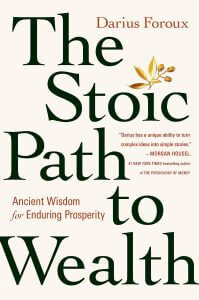Protecting My Sanity
I BEGAN INVESTING in the stock market in 2007. Within a year, I’d lost 60%. My response was like that of almost any human: I stopped investing.
That’s what happens to most people who start investing at the height of a bubble. They invest in something when everybody else does. And when everything comes crashing down, the pain of loss is so bad they swear they’ll never invest again.
While I missed out on huge returns in the years that followed the financial crisis, I spent my time figuring out how successful investors stayed in the game. I learned that the key to wealth building is managing emotions. In my experience, investing is 9% theory, 1% execution and 90% managing our emotions.
 That’s why I’ve been applying the philosophy of Stoicism to my investing strategy. Stoicism is an ancient Greek philosophy that started in the third century BC. The foundation of Stoicism is based on the notion that we should know what’s within our control and what isn’t. At its core, Stoicism is a way of protecting our sanity by managing our emotions.
That’s why I’ve been applying the philosophy of Stoicism to my investing strategy. Stoicism is an ancient Greek philosophy that started in the third century BC. The foundation of Stoicism is based on the notion that we should know what’s within our control and what isn’t. At its core, Stoicism is a way of protecting our sanity by managing our emotions.
This is particularly important when the market goes down. So many investors abandon their strategy at the first sign of market turmoil. As we all know, that’s a recipe for losing money. If we can find a way to become consistent investors throughout our lifetime, through the market’s ups and especially the downs, it’s all but inevitable that we’ll build wealth.
Surviving downturns. Whether we’re a seasoned trader or a retail investor who’s just starting out, investing comes with pain. Every time we make a trade, we run the risk of losing money and missing out on other opportunities.
If we’re afraid of those things, we make life hard for ourselves—especially when there’s a market downturn. During those times, there’s nothing we can do to change the overall market. Sure, we could pull out of the market. Otherwise, we just have to find a way to invest our way through it.
Some investors blame their own judgment or skills when they lose money. They try to find answers in the market. They think they need to spend more time studying and analyzing. But what they really need to do is accept that there’s no one to blame.
The Stoic philosopher, Epictetus, talked about how we often blame others for the way we feel. And if we don’t blame others, we blame ourselves. But both of those approaches are wrong. Epictetus said, “When you blame others for your negative feelings, you are being ignorant. When you blame yourself for your negative feelings, you are making progress. You are being wise when you stop blaming yourself or others.”
Similarly, when we blame the market or ourselves for our results, we’re wasting our energy. If we’re invested in risky assets and we’ve made the right decisions, we shouldn’t worry about the things that are outside of our control—like a market downturn.
Throughout the year, there are always rough periods in the market. Whether the market is reacting to rising bond yields, changing inflation forecasts, interest rates or anything else, we must remind ourselves that market downturns are temporary.
Losing sleep. Stoicism has its limits. If we’re invested in risky assets that plunge 20% in a single day, I don’t think even the world’s most stoic person would remain calm.
That’s why I avoid putting my money in risky assets that cause me to lose sleep. When I invest in the S&P 500 index, I don’t worry whether the 500 greatest companies in the world will still be around when I wake up. I’m 100% confident the world will keep moving forward and that many companies will do the same.
But if I hold a big position in a volatile stock, cryptocurrencies or a meme stock, I don’t feel comfortable. But to me, that’s not investing, it’s speculation. If we do that with money we can afford to lose, it’s fine. But if we’re counting on that money to build wealth over time, we’re taking a big risk.
Staying the course. Let’s say we go with a dollar-cost averaging strategy, investing $500 in an S&P 500 index fund every month. Don’t stop if market sentiment turns bad.
While Epictetus wasn’t talking about investing when he said the following, it’s still applicable to today’s stock market: “Once you undertake to do something, stick with it and treat it as something that should be carried through. Don’t pay attention to what people say. It should not influence you in any way.”
This, of course, is easier said than done. But as long as we understand that we aren’t taking undue risk, we have nothing to worry about.
If we want to build wealth over time, we need to keep investing so we can benefit from the power of compounding. We can’t allow our emotions about short-term fluctuations to get in our way.
The biggest threat to an investor is to stop investing. I did that after the 2008-09 crash, and subsequently missed out on one of the biggest bull markets in recent history. Back then, I didn’t know about the principles of Stoicism, so I allowed my emotions to get the best of me.
When the COVID market crash of 2020 happened, I felt an itch, but I remained in the market. I even bought some individual stocks that were on sale, so I ended up putting more money in the market. I learned from Epictetus to stay the course.
As a Stoic investor, we always need to stick with our plan and carry on no matter what. As long as the world keeps progressing, our investments will, too.
 Darius Foroux is the author of eight books, including The Stoic Path to Wealth, which was published this month. He writes about productivity, Stoicism and wealth building. Darius publishes a weekly newsletter called
Wise & Wealthy
.
Darius Foroux is the author of eight books, including The Stoic Path to Wealth, which was published this month. He writes about productivity, Stoicism and wealth building. Darius publishes a weekly newsletter called
Wise & Wealthy
.
The post Protecting My Sanity appeared first on HumbleDollar.



